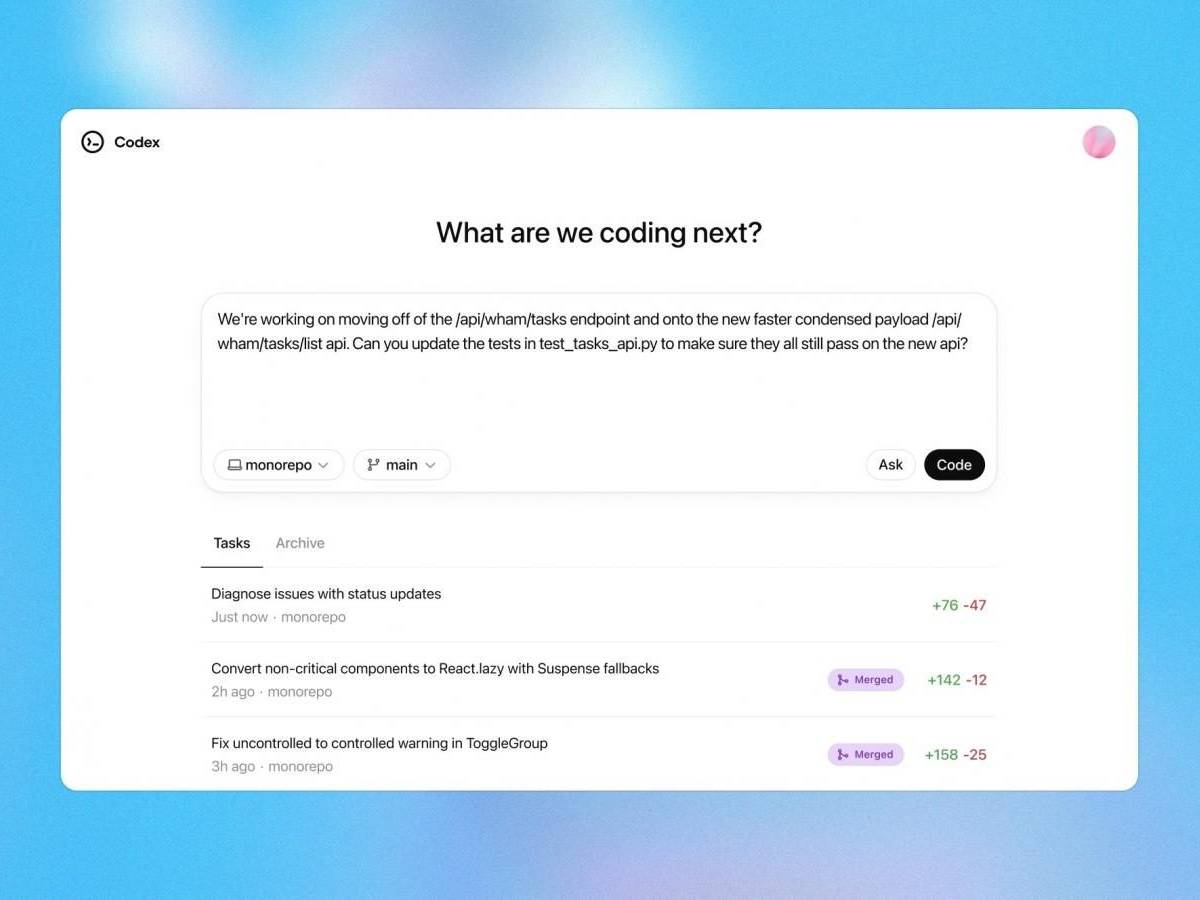
All You Need To Know About Codex: OpenAI’s Powerful New AI Coding Agent (Image: X/ dhanush_chali)
OpenAI has launched Codex, its latest and most ambitious move into the booming world of AI- assisted software engineering.
Announced on Friday as part of a research preview, Codex marks OpenAI’s third AI agent release this year. It represents a major step toward reshaping how developers and even non-developers approach coding tasks.
00:00 Introducing Codex
01:38 Setup and kicking off tasks
05:05 Environments
07:20 Guiding Codex with a Markdown file
12:00 The Codex origin story
14:25 Verifying and reviewing Codex tasks
17:28 Using Codex at OpenAI
20:48 Availability via ChatGPT
21:22 Roadmap and Codex CLI… pic.twitter.com/fqNvGwW8UQ— OpenAI Developers (@OpenAIDevs) May 16, 2025
The agent is built on Codex-1, a specialised version of OpenAI’s advanced o3 reasoning model optimised specifically for software engineering.
It is now available to ChatGPT Pro, Team, and Enterprise users. “It is a fundamentally new way of working,” said Srinivas Narayanan, OpenAI’s Vice President of Engineering, in an interview with The Wall Street Journal.
Also, read| Why Politeness To ChatGPT Cost OpenAI Millions Of Dollars?
He added that the company plans to use the research preview to collect feedback and gradually roll out the technology to ensure safety, improve performance, and deepen user understanding.
What is Codex?
Codex is an autonomous software engineering agent that can carry out multiple coding-related tasks simultaneously. Unlike most current AI coding tools, which function more like real-time copilots, Codex can independently: Write new features, fix bugs, run and iterate tests, answer questions about a user’s existing codebase, infer a company’s coding style and follow pull request (PR) best practices.
OpenAI says Codex runs each task inside its secure sandbox, a private, isolated coding environment, and can return completed tasks in as little as one minute or up to 30 minutes, depending on complexity.
One of Codex’s standout capabilities is its ability to understand and mirror a developer’s unique coding style.
It was trained using reinforcement learning on real-world codebases to produce output that aligns with human-like structure, adherence to instructions, and professional development standards.
Also, read| Sam Altman’s Baby Sleeps In AI-Powered Crib Designed By Bengaluru Entrepreneur Radhika Patil
Codex is not just an evolution of the earlier Codex model (used in GitHub Copilot); it’s a reimagining. With OpenAI’s o3 reasoning core, Codex is now capable of more complex problem-solving, better contextual understanding, and long-term task planning.
This is particularly relevant as the coding assistant space heats up. Microsoft, Amazon, Google, Anthropic, and startups like Anysphere (makers of Cursor) are investing heavily in AI for developers.
Despite OpenAI’s lead in consumer AI chatbots, its coding dominance has been less clear. Experts like Wayne Chi and Valerie Chen, Carnegie Mellon PhD students who evaluate AI coding performance, say that Anthropic’s Sonnet models have so far had more traction among developers. Still, the pace of change is so fast that no clear leader has emerged.
Codex vs. Other OpenAI Agents
Codex is one of three advanced agents OpenAI has introduced in 2025, each serving a different purpose:
1. Codex:
A coding specialist agent that autonomously performs tasks a software engineer would do, from writing and debugging code to reviewing it. It works independently in the cloud and is designed for users with varying levels of coding experience.
2. Operator:
Built on the Computer-Using Agent (CUA) model, Operator combines GPT-4’s visual abilities with high-level reasoning. It interacts with graphical interfaces like buttons and menus using a virtual mouse and keyboard, executing multi-step tasks within a secure browser. It accepts both text and image inputs.
3. Deep Research:
Powered by the o3 model and optimised for web browsing, research, and data analysis, Deep Research scours the web for reliable sources, interprets them, and synthesises comprehensive research reports. It’s aimed at tasks that require deeper analysis and takes 5 to 30 minutes to deliver responses.
Codex is being introduced slowly as part of OpenAI’s research preview strategy, a deliberate approach meant to manage risk, collect feedback, and refine the product before wider release. Users in the Pro, Team, and Enterprise tiers of ChatGPT can try it now.
Additionally, OpenAI is rumoured to be in talks to acquire Windsurf, a well-known AI coding startup, for $3 billion, a move that could further bolster its presence in this space. Both OpenAI and Windsurf declined to comment to the media on the potential deal.













